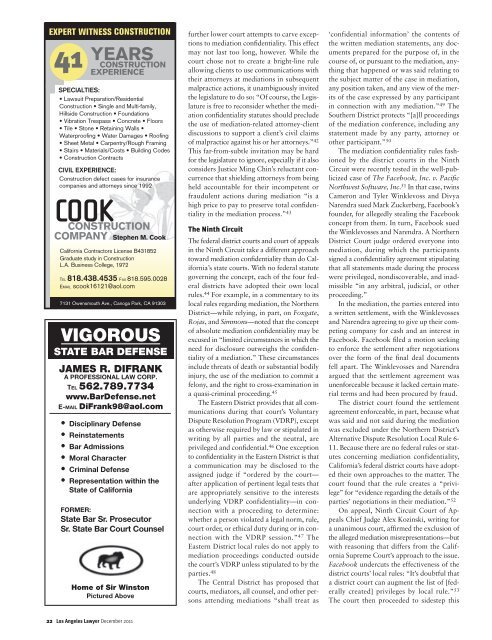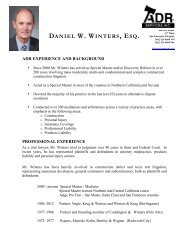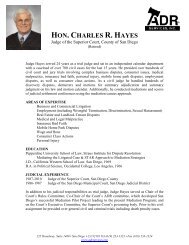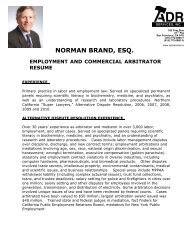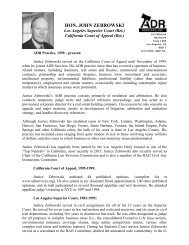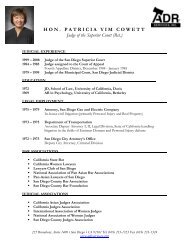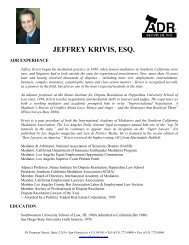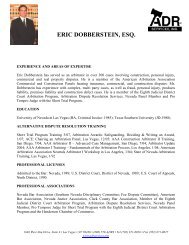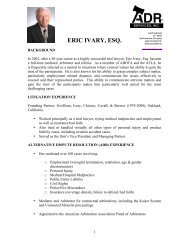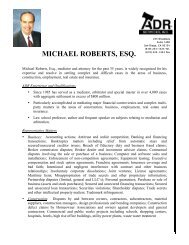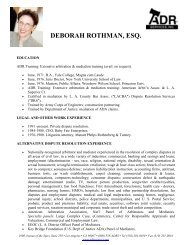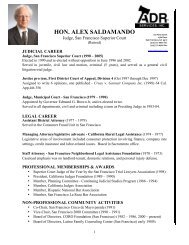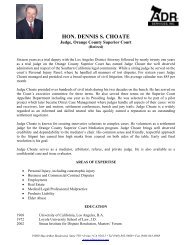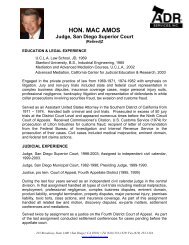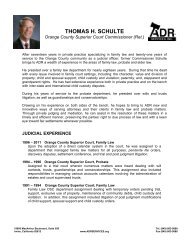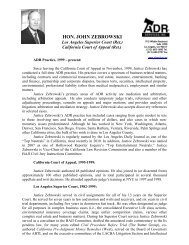Los Angeles Lawyer Article - ADR Services, Inc.
Los Angeles Lawyer Article - ADR Services, Inc.
Los Angeles Lawyer Article - ADR Services, Inc.
Create successful ePaper yourself
Turn your PDF publications into a flip-book with our unique Google optimized e-Paper software.
EXPERT WITNESS CONSTRUCTION<br />
41 YEARS<br />
CONSTRUCTION<br />
EXPERIENCE<br />
SPECIALTIES:<br />
• Lawsuit Preparation/Residential<br />
Construction • Single and Multi-family,<br />
Hillside Construction • Foundations<br />
• Vibration Trespass • Concrete • Floors<br />
• Tile • Stone • Retaining Walls •<br />
Waterproofing • Water Damages • Roofing<br />
• Sheet Metal • Carpentry/Rough Framing<br />
• Stairs • Materials/Costs • Building Codes<br />
• Construction Contracts<br />
CIVIL EXPERIENCE:<br />
Construction defect cases for insurance<br />
companies and attorneys since 1992<br />
COOK<br />
CONSTRUCTION<br />
COMPANY<br />
Stephen M. Cook<br />
California Contractors License B431852<br />
Graduate study in Construction<br />
L.A. Business College, 1972<br />
TEL 818.438.4535 FAX 818.595.0028<br />
EMAIL scook16121@aol.com<br />
7131 Owensmouth Ave., Canoga Park, CA 91303<br />
VIGOROUS<br />
STATE BAR DEFENSE<br />
JAMES R. DIFRANK<br />
A PROFESSIONAL LAW CORP.<br />
TEL 562.789.7734<br />
www.BarDefense.net<br />
E-MAIL DiFrank98@aol.com<br />
• Disciplinary Defense<br />
• Reinstatements<br />
• Bar Admissions<br />
• Moral Character<br />
• Criminal Defense<br />
• Representation within the<br />
State of California<br />
FORMER:<br />
State Bar Sr. Prosecutor<br />
Sr. State Bar Court Counsel<br />
Home of Sir Winston<br />
Pictured Above<br />
further lower court attempts to carve exceptions<br />
to mediation confidentiality. This effect<br />
may not last too long, however. While the<br />
court chose not to create a bright-line rule<br />
allowing clients to use communications with<br />
their attorneys at mediations in subsequent<br />
malpractice actions, it unambiguously invited<br />
the legislature to do so: “Of course, the Legislature<br />
is free to reconsider whether the mediation<br />
confidentiality statutes should preclude<br />
the use of mediation-related attorney-client<br />
discussions to support a client’s civil claims<br />
of malpractice against his or her attorneys.” 42<br />
This far-from-subtle invitation may be hard<br />
for the legislature to ignore, especially if it also<br />
considers Justice Ming Chin’s reluctant concurrence<br />
that shielding attorneys from being<br />
held accountable for their incompetent or<br />
fraudulent actions during mediation “is a<br />
high price to pay to preserve total confidentiality<br />
in the mediation process.” 43<br />
The Ninth Circuit<br />
The federal district courts and court of appeals<br />
in the Ninth Circuit take a different approach<br />
toward mediation confidentiality than do California’s<br />
state courts. With no federal statute<br />
governing the concept, each of the four federal<br />
districts have adopted their own local<br />
rules. 44 For example, in a commentary to its<br />
local rules regarding mediation, the Northern<br />
District—while relying, in part, on Foxgate,<br />
Rojas, and Simmons—noted that the concept<br />
of absolute mediation confidentiality may be<br />
excused in “limited circumstances in which the<br />
need for disclosure outweighs the confidentiality<br />
of a mediation.” These circumstances<br />
include threats of death or substantial bodily<br />
injury, the use of the mediation to commit a<br />
felony, and the right to cross-examination in<br />
a quasi-criminal proceeding. 45<br />
The Eastern District provides that all communications<br />
during that court’s Voluntary<br />
Dispute Resolution Program (VDRP), except<br />
as otherwise required by law or stipulated in<br />
writing by all parties and the neutral, are<br />
privileged and confidential. 46 One exception<br />
to confidentiality in the Eastern District is that<br />
a communication may be disclosed to the<br />
assigned judge if “ordered by the court—<br />
after application of pertinent legal tests that<br />
are appropriately sensitive to the interests<br />
underlying VDRP confidentiality—in connection<br />
with a proceeding to determine:<br />
whether a person violated a legal norm, rule,<br />
court order, or ethical duty during or in connection<br />
with the VDRP session.” 47 The<br />
Eastern District local rules do not apply to<br />
mediation proceedings conducted outside<br />
the court’s VDRP unless stipulated to by the<br />
parties. 48<br />
The Central District has proposed that<br />
courts, mediators, all counsel, and other persons<br />
attending mediations “shall treat as<br />
‘confidential information’ the contents of<br />
the written mediation statements, any documents<br />
prepared for the purpose of, in the<br />
course of, or pursuant to the mediation, anything<br />
that happened or was said relating to<br />
the subject matter of the case in mediation,<br />
any position taken, and any view of the merits<br />
of the case expressed by any participant<br />
in connection with any mediation.” 49 The<br />
Southern District protects “[a]ll proceedings<br />
of the mediation conference, including any<br />
statement made by any party, attorney or<br />
other participant.” 50<br />
The mediation confidentiality rules fashioned<br />
by the district courts in the Ninth<br />
Circuit were recently tested in the well-publicized<br />
case of The Facebook, <strong>Inc</strong>. v. Pacific<br />
Northwest Software, <strong>Inc</strong>. 51 In that case, twins<br />
Cameron and Tyler Winklevoss and Divya<br />
Narendra sued Mark Zuckerberg, Facebook’s<br />
founder, for allegedly stealing the Facebook<br />
concept from them. In turn, Facebook sued<br />
the Winklevosses and Narendra. A Northern<br />
District Court judge ordered everyone into<br />
mediation, during which the participants<br />
signed a confidentiality agreement stipulating<br />
that all statements made during the process<br />
were privileged, nondiscoverable, and inadmissible<br />
“in any arbitral, judicial, or other<br />
proceeding.”<br />
In the mediation, the parties entered into<br />
a written settlement, with the Winklevosses<br />
and Narendra agreeing to give up their competing<br />
company for cash and an interest in<br />
Facebook. Facebook filed a motion seeking<br />
to enforce the settlement after negotiations<br />
over the form of the final deal documents<br />
fell apart. The Winklevosses and Narendra<br />
argued that the settlement agreement was<br />
unenforceable because it lacked certain material<br />
terms and had been procured by fraud.<br />
The district court found the settlement<br />
agreement enforceable, in part, because what<br />
was said and not said during the mediation<br />
was excluded under the Northern District’s<br />
Alternative Dispute Resolution Local Rule 6-<br />
11. Because there are no federal rules or statutes<br />
concerning mediation confidentiality,<br />
California’s federal district courts have adopted<br />
their own approaches to the matter. The<br />
court found that the rule creates a “privilege”<br />
for “evidence regarding the details of the<br />
parties’ negotiations in their mediation.” 52<br />
On appeal, Ninth Circuit Court of Appeals<br />
Chief Judge Alex Kozinski, writing for<br />
a unanimous court, affirmed the exclusion of<br />
the alleged mediation misrepresentations—but<br />
with reasoning that differs from the California<br />
Supreme Court’s approach to the issue.<br />
Facebook undercuts the effectiveness of the<br />
district courts’ local rules: “It’s doubtful that<br />
a district court can augment the list of [federally<br />
created] privileges by local rule.” 53<br />
The court then proceeded to sidestep this<br />
22 <strong>Los</strong> <strong>Angeles</strong> <strong>Lawyer</strong> December 2011


